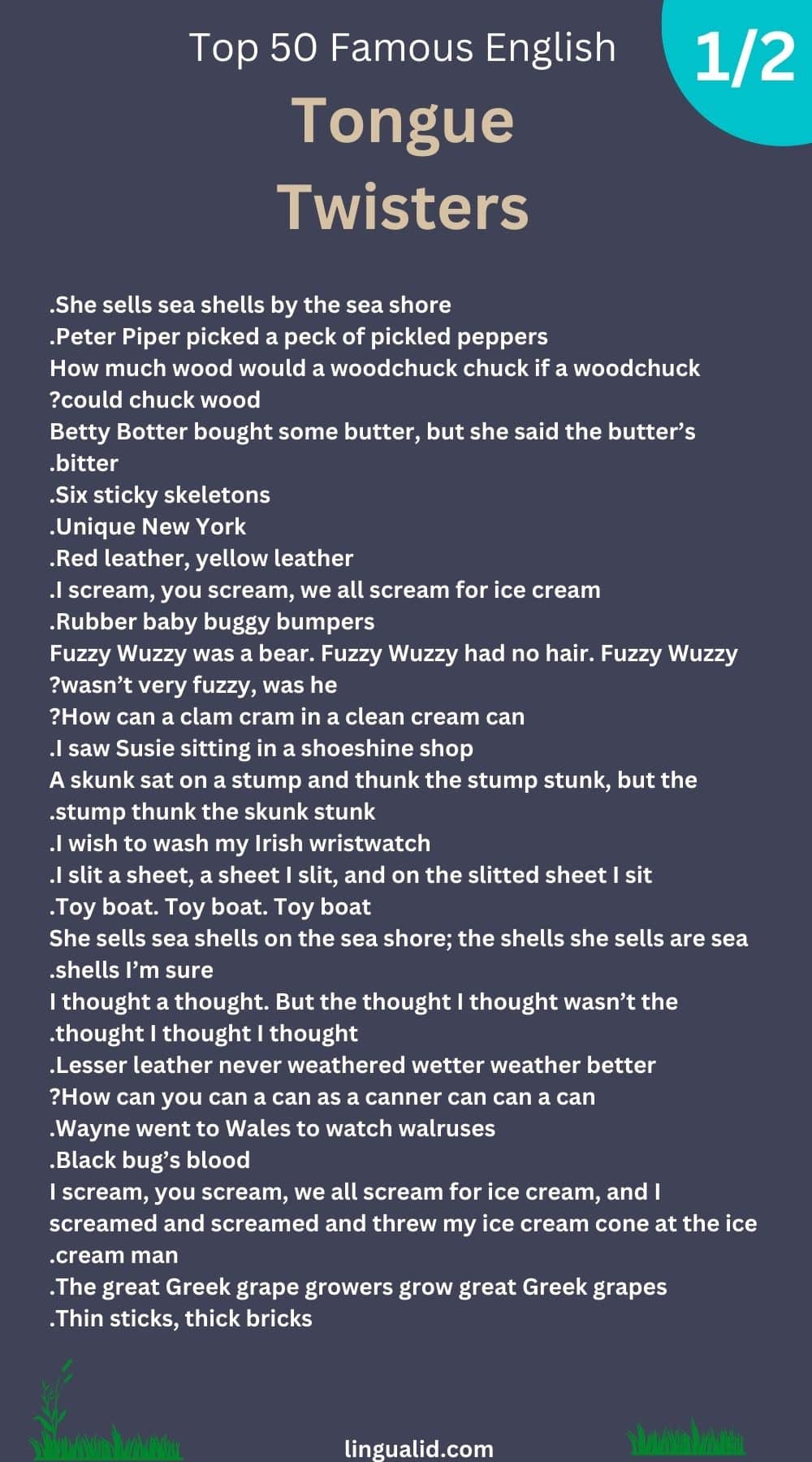Introduction:
In this guide, we’ll explore the fun, challenges, and practical applications of mastering tongue twisters, providing tips and insights along the way. Whether you’re a language learner, speech enthusiast, or simply looking for a good laugh, join us as we unravel the mysteries of English tongue twisters together!
Key Takeaways:
- Fun and Educational: English tongue twisters offer a fun and engaging way to improve pronunciation, fluency, and articulation in language learners and speakers of all ages.
- Challenging Yet Beneficial: While tongue twisters can be challenging to master, consistent practice can lead to significant improvements in speech skills, making them valuable tools for language learning and speech therapy.
- Cultural Significance: Tongue twisters have deep roots in folklore and tradition, with variations found in cultures around the world. They are also prominent in popular culture, appearing in movies, TV shows, and internet challenges.
- Versatility: Tongue twisters can be used in various settings, including classrooms, speech therapy sessions, social gatherings, and public speaking warm-ups, highlighting their versatility and universal appeal.
- Continuous Evolution: Tongue twisters continue to evolve over time, reflecting changes in language use and cultural trends. Whether reciting classic favorites or creating new ones, they remain an enduring form of linguistic entertainment and exercise.
What Are Tongue Twisters?
Tongue twisters are sequences of words or phrases that are deliberately difficult to pronounce, typically due to their repetitive sounds, alliteration, or rapid succession of similar or conflicting sounds. These linguistic puzzles are often used for entertainment, language learning, speech therapy, and as vocal warm-up exercises. The challenge of tongue twisters lies in trying to say them quickly and accurately without stumbling over the words, which can result in humorous or frustrating attempts.
Why are Tongue Twisters Popular?
The Fun Element
Tongue twisters offer amusement and entertainment, particularly in social settings where friends and family gather to test their linguistic prowess. The joy of attempting to say these phrases quickly and accurately adds a playful element to conversations and gatherings.
Language Learning Tool
Beyond their entertainment value, tongue twisters serve as valuable tools for language learners. By practicing these challenging phrases, learners can improve their pronunciation, fluency, and overall command of the language.
Famous English Tongue Twisters: A List Of 50
Some tongue twisters have achieved iconic status due to their catchy rhythms and tricky combinations of sounds. Here is our list of 50:
She sells sea shells by the seashore.
Peter Piper picked a peck of pickled peppers.
How much wood would a woodchuck chuck if a woodchuck could chuck wood?
Betty Botter bought some butter, but she said the butter’s bitter.
Six sticky skeletons.
Unique New York.
Red leather, yellow leather.
I scream, you scream, we all scream for ice cream.
Rubber baby buggy bumpers.
Fuzzy Wuzzy was a bear. Fuzzy Wuzzy had no hair. Fuzzy Wuzzy wasn’t very fuzzy, was he?
How can a clam cram in a clean cream can?
I saw Susie sitting in a shoeshine shop.
A skunk sat on a stump and thunk the stump stunk, but the stump thunk the skunk stunk.
I wish to wash my Irish wristwatch.
I slit a sheet, a sheet I slit, and on the slitted sheet I sit.
Toy boat. Toy boat. Toy boat.
She sells sea shells on the seashore; the shells she sells are sea shells I’m sure.
I thought a thought. But the thought I thought wasn’t the thought I thought I thought.
Lesser leather never weathered wetter weather better.
How can you can a can as a canner can can a can?
Wayne went to Wales to watch walruses.
Black bug’s blood.
I scream, you scream, we all scream for ice cream, and I screamed and screamed and threw my ice cream cone at the ice cream man.
The great Greek grape growers grow great Greek grapes.
Thin sticks, thick bricks.
Round and round the rugged rock the ragged rascal ran.
Swan swam over the sea; swim, swan, swim! Swan swam back again; well swum, swan!
Fuzzy duck.
If two witches would watch two watches, which witch would watch which watch?
One-one was a race horse. Two-two was one too. One-one won one race. Two-two won one too.
Six slimy snails slid slowly seaward.
Eleven benevolent elephants.
Wally’s witty widow Winnie, watched Willy’s wooden widgets.
Willie’s really weary.
How many cookies could a good cook cook If a good cook could cook cookies? A good cook could cook as much cookies as a good cook who could cook cookies.
If a dog chews shoes, whose shoes does he choose?
Ned Nott was shot and Sam Shott was not. So it is better to be Shott than Nott. Some say Nott was not shot. But Shott says he shot Nott.
Susie works in a shoeshine shop. Where she shines she sits, and where she sits she shines.
I wish to wash my Irish wristwatch.
If you notice this notice, you will notice that this notice is not worth noticing.
The big black bug bit the big black bear, but the big black bear bit the big black bug back!
Fred fed Ted bread, and Ted fed Fred bread.
How much ground would a groundhog hog, if a groundhog could hog ground? A groundhog would hog all the ground he could hog, if a groundhog could hog ground.
I saw a kitten eating chicken in the kitchen.
A box of mixed biscuits, a mixed biscuit box.
The sixth sick sheik’s sixth sheep’s sick.
The thirty-three thieves thought that they thrilled the throne throughout Thursday.
I thought I thought of thinking of thanking you.
The great Greek grape growers grow great Greek grapes.
How can a clam cram in a clean cream can?
Benefits of Practicing English Tongue Twisters
Improving Pronunciation
Repeatedly saying tongue twisters can help individuals overcome pronunciation challenges by forcing them to enunciate each syllable clearly and accurately.
Enhancing Fluency
Regular practice with tongue twisters can improve fluency by training the mouth and tongue muscles to move more smoothly and swiftly while speaking.
Developing Articulation
Tongue twisters provide an excellent workout for articulation, helping speakers become more precise and articulate in their speech.
Tips for Mastering Tongue Twisters
Start Slowly
Begin by saying the tongue twister slowly and gradually increase speed as you become more comfortable with the phrase.
Break it Down
Focus on mastering small sections of the tongue twister before attempting to say the entire phrase.
Practice Regularly
Consistent practice is key to mastering tongue twisters. Set aside time each day to practice and track your progress over time.
Tongue Twisters in Education
Classroom Activities
Educators often incorporate tongue twisters into language lessons as a fun and interactive way to improve students’ pronunciation and fluency.
Speech Therapy
Speech therapists frequently use tongue twisters as exercises to help individuals overcome speech impediments and improve their articulation skills.
Cultural Significance
Folklore and Tradition
Tongue twisters have deep roots in folklore and oral tradition, with variations found in cultures around the world.
Entertainment Industry
Tongue twisters are a staple in the entertainment industry, appearing in movies, television shows, and even advertisements as memorable and catchy phrases.
The Science Behind Tongue Twisters
Cognitive Challenges
Tongue twisters present cognitive challenges by requiring speakers to process and articulate complex sequences of sounds quickly and accurately.
Linguistic Studies
Researchers study tongue twisters to better understand the mechanics of speech production and the cognitive processes involved in language learning and processing.
Challenges and Common Mistakes
Frustration
Many individuals experience frustration when attempting to master tongue twisters, especially when they repeatedly stumble over difficult phrases.
Mispronunciation
Mispronouncing words or stumbling over sounds is common when practicing tongue twisters, but with perseverance, improvement is achievable.
Tongue Tied
Feeling “tongue-tied” or unable to articulate words clearly is a common challenge when attempting particularly tricky tongue twisters.
How to Create Your Own Tongue Twister
Playing with Sounds
Experiment with alliteration, rhyme, and wordplay to create your own tongue twisters that are challenging yet fun to say.
Experimenting with Words
Mix and match words and phrases to create unique tongue twisters that suit your interests and linguistic abilities.
Global Variations of Tongue Twisters
Multilingual Tongue Twisters
Languages around the world have their own versions of tongue twisters, each with its own unique challenges and linguistic features.
Cross-Cultural Adaptations
Tongue twisters are often translated and adapted across cultures, showcasing the universal appeal of these playful linguistic exercises.
Tongue Twisters in Popular Culture
Movies and TV Shows
Tongue twisters frequently make appearances in movies and television shows, often serving as memorable lines or comedic moments.
Internet Challenges
Online platforms have popularized tongue twister challenges, encouraging users to record themselves attempting difficult tongue twisters and share their performances with others.
Tongue Twisters for Different Occasions
Icebreakers
Tongue twisters are excellent icebreakers at parties, meetings, and social gatherings, sparking laughter and camaraderie among participants.
Public Speaking Warm-Ups
Public speakers often use tongue twisters as warm-up exercises to loosen their vocal cords and improve their articulation before giving a speech or presentation.
The Evolution of Tongue Twisters
Historical Origins
Tongue twisters have roots in oral traditions and folklore, evolving over time to become beloved linguistic puzzles enjoyed by people around the world.
Modern Adaptations
Contemporary tongue twisters continue to emerge in popular culture, reflecting changes in language use and cultural trends.

Related: How To Learn English: Pieces Of Advice From Polyglots
Conclusion
English tongue twisters are more than just playful word games; they are valuable tools for improving pronunciation, fluency, and articulation in language learners and speakers of all ages. Whether reciting classic favorites or creating your own, mastering tongue twisters offers both entertainment and educational benefits.
Oualid Cheddadi is the founder of Lingualid, a platform that inspires independent language learners worldwide, regardless of the language they are learning. The name “Lingualid” is derived from the Portuguese word for “language,” “língua,” and the last three letters of Oualid’s name, “Lid.”



